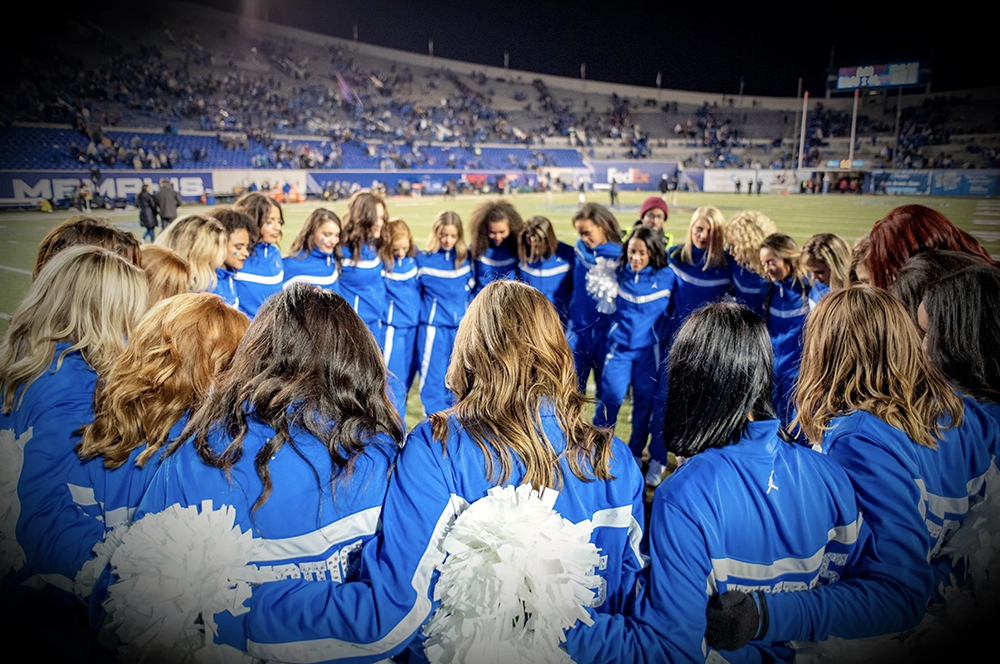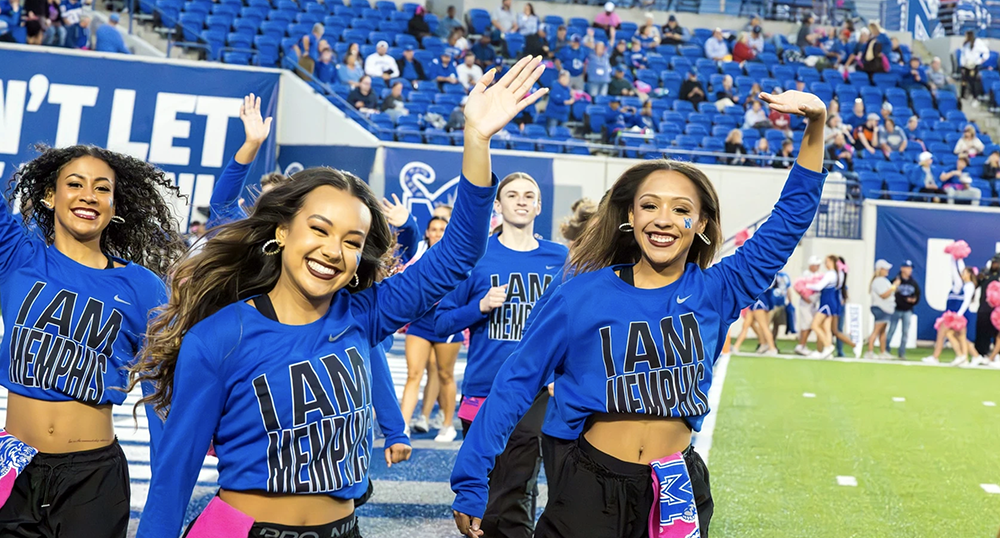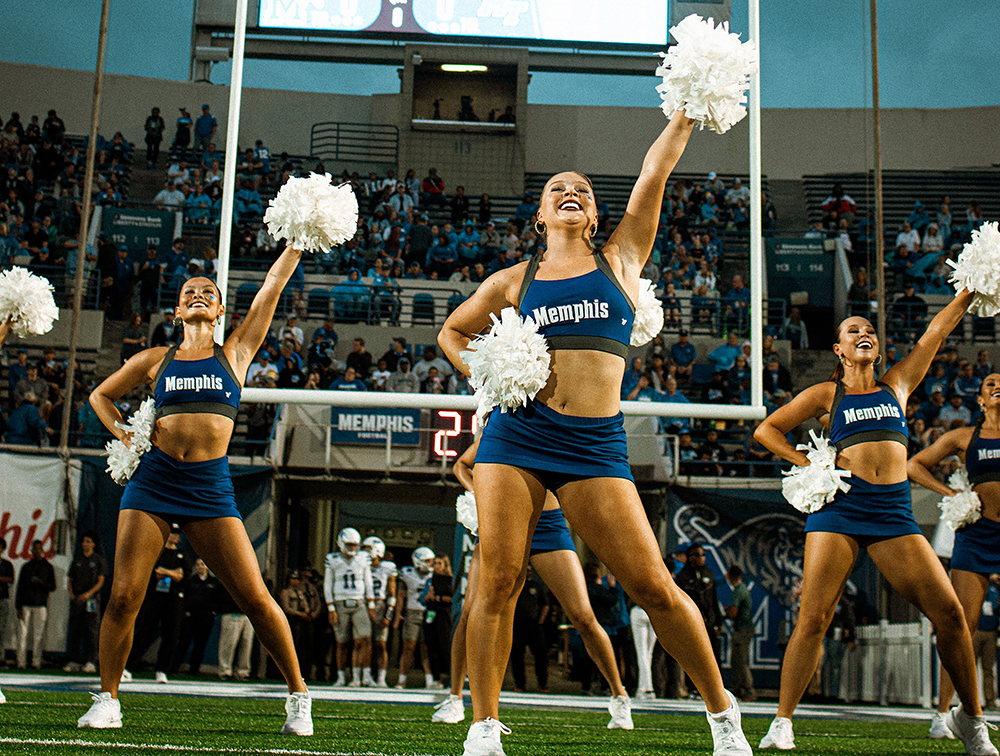For a few weeks since mid-December, the volleyball gym at University of Memphis has been transformed into a dance studio, mats taped over the court floor, with the recognizable Tigers flags and megaphones tucked to the side. Mirrors have been rolled into the end of the court. The Pom Squad and Ambush Crew have been practicing their routines there, with rehearsals ramping up to nearly every day, hours at a time, in preparation for the UCA & UDA College Cheerleading and Dance Team National Championship in Orlando, January 17th to 19th.
At today’s practice, while I speak with Carol Lloyd, University of Memphis’ spirit coordinator and head dance coach, the dancers warm up, one doing aerials, flipping her legs over her heads. Another jumps, knees turned out with her toes meeting to form a diamond in the air before she lands; soon, back up she springs, another brief diamond formed.
On the other side of the mat, a group goes through a part of their routine to be performed in a mere few days. Their footsteps are sharp, measured according to counts, heads turning in unison; there’s no music, but they are in sync. They lift one of their teammates in the air, effortlessly — or, so it appears to the untrained eye. Something’s off, though they haven’t quite figured out what exactly. Should so-and-so adjust her leg? Should it be bent at the knee? Lloyd asks for feedback from the athletes, pointing out collaboration’s role in their process. They run through the counts again, and again, and again, and will again many more times. This part is only a few seconds of an entire routine that they’ve been working on since November.
“It’s so detailed,” says Lloyd. “I don’t think a lot of people realize how much goes into just dancing for this minute-50 seconds.”
The Pom Squad and Ambush Crew compete in three categories: game day, hip-hop, and pom. In a game day performance, dancers recreate the live game experience with a band, fight song, Pouncer the mascot, and lots of spirit. Pom uses poms and can be a mix of hip-hop and jazz.
Last year, the team took home the national championship for game day and placed third in hip-hop and seventh in pom. That same weekend, the university’s cheerleaders won the national championship in small coed.
Winning titles isn’t unusual for U of M’s spirit squads, which include the cheer team, the Pom Squad, and the Ambush Crew, which Lloyd started last year to specialize in hip-hop during game days and compete with the Pom Squad at nationals. The cheer team holds seven national titles. The Pom Squad has 16, including nine consecutive titles from 1986 to 1994.
“It’s always harder to stay on top than it is to get there,” Lloyd says. “I always feel pressure, but pressure is a privilege almost. And they do have the pressure of [having won last year], but also we don’t really harp a lot on it.”
On the back of the mirrors that the dancers rolled into the volleyball gym, the athletes have posted a sign that says, “Go with the goal of hitting your shit, not with the goal of winning.” They even tally up how many “full-outs” they do — how many times they practice their routines as if they’re performing in front of an audience. That number will get up to the 70s by the time they leave for Orlando, the dancers say. It’s about quantifying achievements, big and small.
“In our league, everybody’s top-notch; everybody is so good and so elite,” Lloyd says. “It’s kind of hard sometimes to realize we’re one of those people, too. Especially with Memphis, because everybody knows who you are [in the college dance world] and it’s such a legacy — the Memphis dance team. Everybody knows you’re from Memphis. They look up to you; you’re a staple in dance team history.”

It’s a Legacy
The first national collegiate dance team championship took place in 1986, and Memphis State, as it was then, won — and it won for the next eight years.
Lloyd, a Memphis native, cheered throughout high school and was on the college’s pom team during its champion-winning streak from 1989 to 1993. She would go on to succeed her college coach Cheri Ganong-Robinson in 2004.
While, yes, winning titles marked her time on U of M’s Pom Squad, she also recalls traveling to entertain at NBA games, even going overseas. “We don’t do that any more,” Lloyd says, “and I miss some of our halftimes ’cause we used to dance for four to five minutes every single halftime and nobody left their seats. I don’t miss preparing for it because it is a lot and they do so much more now. … This sport has become so big — way more athletic, technical — so to still be one of the top teams and still keep it at that level is great.”
Other dance alumnae and current athletes agree. Bella Roy, a senior pom dancer, speaks of watching videos of older routines with alumnae at a Christmas party. “They’re like, ‘That’s me, that’s me,’ but it’s just crazy how it’s changed so much. But then, it still is so similar. It’s that crazy drive and that Memphis family; the legacy is just like no other.”
And it’s that legacy that brought Roy from Franklin, Tennessee, to Memphis initially. “I knew from a very young age, I wanted to dance in college,” she says. “Memphis has been so well-known for so long as this amazing program across the nation in the dance world, so to be a part of it is absolutely amazing.”
University of Memphis’ reputation for its dance team also attracted freshman Linda Gail Rutland. She and Roy actually attended the same dance studio back in Franklin, and now they’re on the team together, if only for one overlapping year. For both of them, dance — more precisely dancing competitively on a team — has constituted most of their lives’ passion.
“[Dancing on a team] comes to the point where, of course, you always want to win, but it’s not even about winning,” Rutland says. “It’s the memories and working for something bigger than yourself, being there for your teammates.”
“You’re all there because you chose to be there and you want to be there and you want to get better and be pushed to do good,” Roy adds. “Carol [Lloyd] is an amazing coach. She can be tough, but it’s in a good way. It’s in a great way. She gives us that tough love that we need.”
For that matter, last year the National Dance Coaches Association named Lloyd College Coach of the Year. Having accrued so many titles as a student athlete and as a coach, this one speaks to Lloyd’s particular knack for leading her teams. After all, she’s been coaching since was 18.
Today, in addition to working for U of M, she coaches for the Collierville Middle School and Collierville High School cheer teams. Before accepting her position as spirit coordinator in 2013, she also coached for U of M’s cheer team, now under the leadership of Jasmine Freeman.
“Seeing the athletes grow as individuals and as dancers, that’s always rewarding,” Lloyd says. “Plus, I mean, it’s challenging for them.”

It’s a Sport
“It’s easy to get so hard on yourself when you have all these long practices and you’re sore and ‘Oh, I can’t make it to my spot’ or this or that,” Roy says. “But then the alumnae are always like, ‘Oh, you’re flipping upside down, and you’re doing 12 turns,’ and we’re like, ‘Wait, we really are good.’”
Yet neither the NCAA nor the Office of Civil Rights, which enforces Title IX, consider collegiate dance or cheer as sports, defining “sports” as activities whose purpose is competing, not “supporting” other sports on the sidelines. But the spirit squads consider themselves athletes, training hard and competing, albeit once a year, and even though they are at every football and basketball game, they’re also at community and philanthropic events because, as they would say, they’re the “face” of the university.
While they receive some athletic benefits from the school like access to training and the athletic mental performance department, U of M’s athletics website doesn’t list the Pom Squad, Ambush Crew, or cheer team under women’s sports but instead offers a link in a sidebar, along with athletic news and a composite schedule, suggesting that their status as a sport is in limbo even at their home in Memphis.
As it is, the spirit teams have to fundraise for the majority of their budget. Each year, the dancers and cheerleaders put on a golf tournament, host dance and cheer clinics, sell popcorn, offer appearances, and more.
“It takes about $120 to $140 thousand each year to cover everything that we need,” Lloyd says. For reference, according to CNBC, U of M’s athletic program is worth about $148 million. That puts the school third among the American Athletic Conference, behind East Carolina University ($153 million) and the University of South Florida ($150 million).
“We’re constantly looking for other ways to make money for them so they don’t have to keep fundraising,” Lloyd says.
The spirit squads also don’t have a dedicated facility, which can add another strain on the budget and affects efficiency. The cheer team practices at an All-Star gym out in Collierville, and the Pom Squad and Ambush Crew have bounced around for the past few years, last year renting a church gym and this year using one of the university’s rec gyms until the volleyball gym opened up. “This is my fourth year, and this is our third facility that we’ve been in,” Roy says.
For each practice in the rec gym, the athletes had to tape down the 10-paneled floor mats they dance on, take up the tape back up, stack the mats on the side, and store away the mirrors and all their props like the megaphones and flags because it’s a shared space. “And that tape is extremely expensive,” Lloyd adds. “We need a facility for us.”
Rutland puts a positive spin on it: “Even though we don’t have our own facility and sometimes it is a pain, doing it with your teammates, honestly, we bond.”

It’s a Family
At today’s practice, where 20 dancers are in the pom routine being rehearsed, a few who aren’t in the number have joined to cheer their teammates on. This is typical, Lloyd says. “It’s a good group of people. They’re grateful, very respectful. They’re hella talented. They’re supportive, and that’s important with anything.”
While we speak, Lloyd will interrupt with brief corrections and praises for the individual dancers, her eyes constantly roving the mat filled with multiple performers. “When you know that someone is struggling in a certain part, you’ve got to scream for them,” she says to her athletes. “If everybody gets in their head, start yelling. The mat talk is what’s going to help everybody.”
And so they scream and shout, and so does Lloyd. “This is their family,” Lloyd says, noting that out of 43 team members who are on Pom Squad and Ambush Crew, only four are local.
“I wouldn’t want to be anywhere else,” Rutland says. “I got here and I don’t want to leave. It’s only my freshman year.”
In a few days, Rutland will compete in her first showcase. “I’m so excited,” she says. “Scary, freaked out, I’m so excited.” She’ll compete in the game day category. “It’s like a big party. We really just have fun the whole time. I love cheering on the school and being at the football games and the basketball games and everything, so I just can only imagine how that will feel on the nationals floor.”
Roy, meanwhile, is competing in game day, pom, and hip-hop this year, her last year competing. Hip-hop, she says, has been the dance style that has challenged her the most but the one she’s most grown in since her freshman year. “I’ve learned so much from [Lloyd] and the upperclassmen, and then Ambush Crew took it to another level,” she says. “Everybody knows Memphis hip-hop in the college dance world, so to go out there and be a part of that is so special and fun.”
Memphis has consistently placed in the top four of the hip-hop division since the division started at the competition. “It’s very captivating, telling a story, being very much like, ‘This is us, we are who we are, watch us do our thing,’” Rutland says of the Pom Squad’s hip-hop routines.
“I feel like, too, it kind of ties into our T-shirts that say, ‘I am Memphis,’” Roy adds. “Like, ‘I am the city of Memphis.’ ‘I am Memphis Pom Dance Team Ambush Crew.’ ‘I am a part of this legacy.’
“But that first time my freshman year after we finished hip-hop for semis, when I did my last little smackdown and looked up, I just held my ending pose for at least 10 seconds,” Roy recalls. “It was that moment where I was just, ‘This is what I’ve dreamed of for so long. And I don’t want to leave.’ I was like, ‘I just did this.’ And then last year, that was always my lifelong goal to win a national championship. And to say that I actually did it is crazy, but it’s so worth it. Since I was little, that’s what I wanted.”
Now, as Roy, a supply chain management major, looks to life after college, she says, “Since I’ve danced for so long, I think it’s going to be hard, that transition after college, figuring out what I’m going to do with my life. It’s been school, dance, school, dance, school, dance forever, so it’s hard to imagine a life without it, but I think I’ll continue taking dance classes here and there, doing a normal job. I have found a big passion, though, in teaching dance.”
Roy thought about professional dance in the NBA or NFL, a path that some alumnae have taken, so has Rutland, but neither are sure. “I’m set on living in the moment and enjoying my time here,” says Rutland, a finance major.

It’s Game-Time
The spirit squads traveled to Orlando for the UCA & UDA College Cheerleading and Dance Team National Championship on January 15th, both the dance and cheer teams on the heels of last year’s wins. “We’ll stay true to what we do,” Lloyd says, “just being authentic to our culture. We’re very diverse. We’re a lot of fun, but we’re also very gritty, tough, and still dominating. We don’t try to do what other people do.”
When it’s all over, they’ll fly back on Martin Luther King Jr. Day, and the semester begins the next day. “I’m gonna be so tired,” Roy says, “but I would say I’m still kind of on a high a week after because I get to look at everybody’s videos and see how everybody did.”
The season won’t be over after the championship; the athletes will still perform at basketball games and other events, the spirit squads’ seasons lasting all school year.
At the end of each practice, of which there will be more, the dancers come together in a circle and link pinkies. “Seniors or captains will give a little wrap-up of practice,” Roy says, “just to get everybody in a good headspace before we leave, and then we say the Lord’s Prayer.” The prayer then leads into a chant: “Five, six, seven, eight, whoo, MPDTAC.”
The MPDTAC would stand for Memphis Pom Dream Team (and) Ambush Crew. And, yes, the DT stands for dream team — not the expected dance team — because, according to Lloyd, she’s always coaching the dream team, win or lose.
Follow the Memphis Pom and Ambush Crew here and cheer team here.






 Facebook/Rhodes
Facebook/Rhodes  Rhodes College
Rhodes College